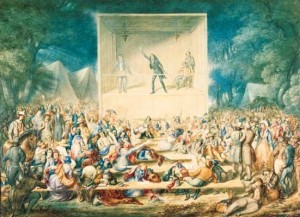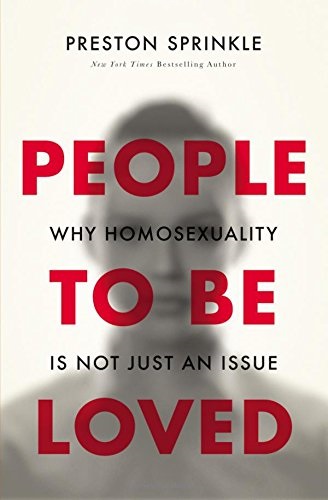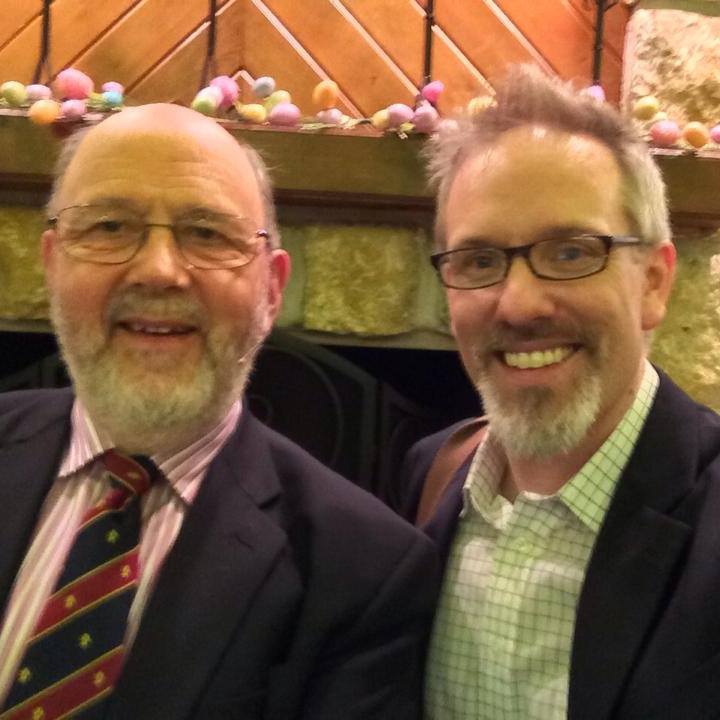
There was a time in the early days of my faith, in the days of my spiritual adolescence, where I prayed (often) for revival, for an outpouring of the Holy Spirit to grip people with religious fervor so that those outside the faith would be compelled to pay attention. I prayed these kinds of prayers for a long time. Recently I realized I don’t pray for revival or spiritual awakening anymore. I still pray, but a request for revival hasn’t crossed my lips for years. As I realized this absent request in my life of prayer, I checked myself: Have I grown cold? Have I grown complacent? Am I backslidden? Does my love for God no longer compel me to desire his work be done on the earth? Am I lazy? Distracted? Unfocused? Have I lost my way? After a prayerful examination of my heart, I must answer “no.”
So why have these prayers vanished from my “prayer list”?
The reasons for not praying for revival are many. Before I share these, I must emphasize these are my reasons. I am not implying praying for revival is a bad thing per se. I am not implying you shouldn’t pray for it. Feel free to pray according for to your conscience. I simply want you to consider praying in a different way. Here are my reasons:
I don’t pray for revival, because I don’t think I ever knew exactly what I was praying for. I can recall many prayers for revival in the past, but I cannot pin down exactly what was in my imagination when I was praying those prayers. I read a lot about the history of revival in North America. I was well aware of the First Great Awakening, Cane Ridge Revival, the Second Great Awakening, the Azusa Street Revival, the Revival at Asbury College in the 1970s. I read Winkie Pratney’s Revival (1984) and the more academic Dynamics of Spiritual Life by Richard F. Lovelace (1979). Good books. I still have them on my shelf, but for whatever reason, the subject of revival was never very clear in my mind when I was praying. Maybe this was fault. In my mind when I was praying for revival, I imagined a large number of Christian people (it was always a large number, always a crowd) repenting of sin with demonstrative, emotional outbursts. For me the emphasis was more on the crowds and the emotional fervor than what God may, or may not, have been doing. Perhaps I had an incomplete or misguided imagination of what revival is. I could be wrong, but I suppose most people think of crowds and emotionally-charged meetings when they think of revival.
I don’t pray for revival, because I have learned the primary purpose of prayer is for me to be properly formed. Prayers for revival are certainly requests telling God what he should do and how he should do it. Don’t misunderstand me: prayer includes making our requests known to God. No problems there, but obsessively praying for revival didn’t form me into the image of Jesus. Praying with a misplaced priority on requests for revival formed me into an irritated, angry, judgmental kind of person. Yuck! I remember the anxiety I felt in praying over and over again for revival and not seeing it! Not seeing the crowds. Not seeing the emotional displays of real love for God. Yes I used the word “real,” because I had become so judgmental that I began to question people’s love for God by how much emotional-affection they displayed. “Why does revival tarry?” asked Leonard Ravenhill. It had something to do with lazy Christians who would rather eat dinner with their friends and occasional sinners! Lazy Christians who would rather go to post-wedding parties where (gasp!) wine was served! Lazy Christians who wasted their time reclining after a large meal with friends instead of praying for revival! (Oh wait. I think I just described Jesus.) Maybe others can pray for revival and not become bitter and aggravated and judgmental. I couldn’t. Rather it seems like I have become more content and less-judgmental, more like Jesus, since I have learned to pray another way.
I don’t pray for revival, because I came to reject chaotic emotional spontaneity as the de facto work of the Holy Spirit. I celebrate the launching of the church into her mission in the world by the outpouring of the Spirit on the day of Pentecost. I read the New Testament (and the entire Bible) through the lens of the the resurrection of Jesus and the gift of the Spirit. I depend on the power, presence, and activity of the Spirit in all of the operations of the church life. To be honest, I personally depend on the Spirit’s power and presence to form me into a husband and dad that reflects the beauty of Jesus in my family life. Nevertheless, I have learned the importance of discerning the difference between an emotional experience and a spiritual experience. I do believe the Holy Spirit has free reign over God’s people to do whatever he wants to do in whatever way he chooses to do it. I do not doubt his presence can overwhelm the emotions and work in such a way that by-passes our plans. I have experienced such encounters with the Spirit. My point is we face an inherent danger if we assume this is the only, or even the primary, way the Spirit works. If we pray for a revival, an outpouring of God’s spirit, and the emotional spontaneity is not there, we will face the temptation to fake it. By “fake it,” I don’t mean we intentionally manipulate people for an emotional response (though regrettably such manipulation happens), rather we enter into some strange sort of psychological drama, conjuring up an emotional reaction and calling it “revival.” I want to be aware of, and submitted to, the presence of God’s Spirit, but I don’t want to fake it.
I don’t pray for revival, because Jesus never commands us to pray for it. Surprisingly Jesus never tells us to pray for what we commonly call “revival.” I know, I know there are many things we pray for that Jesus didn’t specifically tell us to pray for, but throughout the New Testament we don’t see prayers for revival. Yes, we see prayers for the coming of the Spirit, prayers for the work of Jesus to come on the earth, prayers for the kingdom of God to come, prayers for the church, but from my reading, we do not see anything in the New Testament resembling a prayer for a group of people to fall on their knees and cry out for God with tears in their eyes and contrition in their voices. The concept of “revival” was born out of Christendom in Western Christianity, in a place where Christianity was the assumed religion, where Christians needed some mechanism, some construct, to identify authentic Christians from among nominal Christians. I understand that need. We don’t live there anymore. We, in North America, live in a post-Christian, post-Christendom world. We are much more like the pre-Nicene church of the first couple of centuries growing and spreading throughout the pagan empire without a “revival” in the modern sense of the word.
I don’t pray for revival, because I tend to pray kingdom-minded prayers. So much of my faith and prayer life began to change when I began to see the kingdom, when I began to see the rule and reign of Jesus on earth through the church. I first began to see the kingdom as a seminary student at Oral Roberts University, a school “forged in the fires of healing evangelism.” I began to see the healing ministry of Jesus connected to his proclamation of the kingdom of God. Jesus “performed” miracles not to appease the interest of the crowd or even to prove his divinity. He healed people, often by a miracle touch, to demonstrate the very real presence of the kingdom of God in and among the crowd. Jesus revealed the kingdom comes like a seed not like a circus. I know I am running the risk of constructing a caricature, but it seems like much of the talk about “revival,” particularly within modern Pentecostalism, is loud, noisy, and centered-around the platform. I do not believe this image is true among all Pentecostal/charismatics, but there is at least a few pockets in that movement who see “revival” in terms of a sensational circus built around celebrity ministry super-stars. The kingdom of God is NOT like the sensational circus. The kingdom is like yeast in the dough that makes the bread rise. It is like seed planted in a garden. It is like a treasure buried in a field sought by a man who for joy (an emotional reaction!) sold all he had and bought the field. Prayers for revival are more centered around personal spiritual encounters than the kingdom of God. As I continue to see the kingdom, I continue to pray kingdom-minded prayers. I haven’t prayed for revival for years, but I pray “may your kingdom come” nearly every day.
I don’t pray for revival, because often “revival” does not build up the church. It seems like my prayers for revival began to diminish when my prayers for the church increased. I love the church. I love the church not only for what the church has done for me, but because Jesus loves the church and his work through the Spirit is to build his church. From my experience, “revivals” do not build the church long term. The First and Second Great Awakenings produced undeniable marks on the religious consciousness of eighteenth and nineteenth century America, but what churches were born of those revivals? Jonathan Edwards’ revival in the early eighteenth century was among the Congregationalists, a movement that, to my knowledge, no longer exists. Conversely, the Methodist movement (which was a revival movement of sorts) not only featured open-air meetings, but a methodological (pun intended!) approach to church planting. The Azusa Street Revival did in fact produce lots of churches and denominations. I cannot deny the lasting effects of the seminal modern Pentecostal revival. However, I have heard of too many Pentecostal revivals that draw big crowds but leave the host church devastated. Those who focus their prayer life on revival easily become (as I did) irritated, aggravated, and critical. Too often they end up blaming the institutional church or established churches for the lack of revival and thus become embittered towards the church. They form their separate prayer groups, praying for revival, but they refuse to participate fully in one local church because they cannot find a church “spiritually-minded” enough. The Spirit poured out on the day of Pentecost launched the church and this same Spirit empowers the church. So we pray for the Spirit to come. We pray for Christ to come.
So how do I pray?
I pray for the kingdom to come.
I pray for God’s mercy to cleanse and defend the church.
I pray for people to seek after and find Jesus.
I pray for God to bring the nations into his fold.
I pray for the Spirit to be outpoured on all flesh.
I pray God would hasten the coming of his kingdom.
Most of all, I pray that I may be conformed, by the Spirit, into the image of Jesus for the joy of God the Father.
If by “revival” you mean, like J.I. Packer, an ongoing flow of grace where by:
1. God comes down.
2. God’s Word pierces.
3. Man’s sin is seen.
4. Christ’s cross is valued.
5. Change goes deep.
6. Love breaks out.
7. Joy fills hearts.
8. Each church becomes itself—becomes, that is, the people of the divine presence in an experiential, as distinct from merely notional, sense.
9. The lost are found.*
…then fine by me, pray for these things.
But if by revival, you mean something else than the church becoming itself, then I encourage you to pray for something else.
If you are interested in growing in your prayer life, come join us for our Prayer School with Brian Zahnd, Friday & Saturday, October 17-18, 2014. Cost is only $20. Register here: https://prayerschool.wolc.com/#register
(*List complied by Justin Taylor http://thegospelcoalition.org/blogs/justintaylor/2010/02/17/what-is-revival/)
 As most of you know by now, I announced Tuesday (October 2) that I have signed my first publishing contract. I have been working on a discipleship book since summer 2018 and after a number of rejections from other publishers, I received an enthusiastic yes from Herald Press! My book entitled By The Way: Getting Serious About Following Jesus will be released summer 2019.
As most of you know by now, I announced Tuesday (October 2) that I have signed my first publishing contract. I have been working on a discipleship book since summer 2018 and after a number of rejections from other publishers, I received an enthusiastic yes from Herald Press! My book entitled By The Way: Getting Serious About Following Jesus will be released summer 2019.







